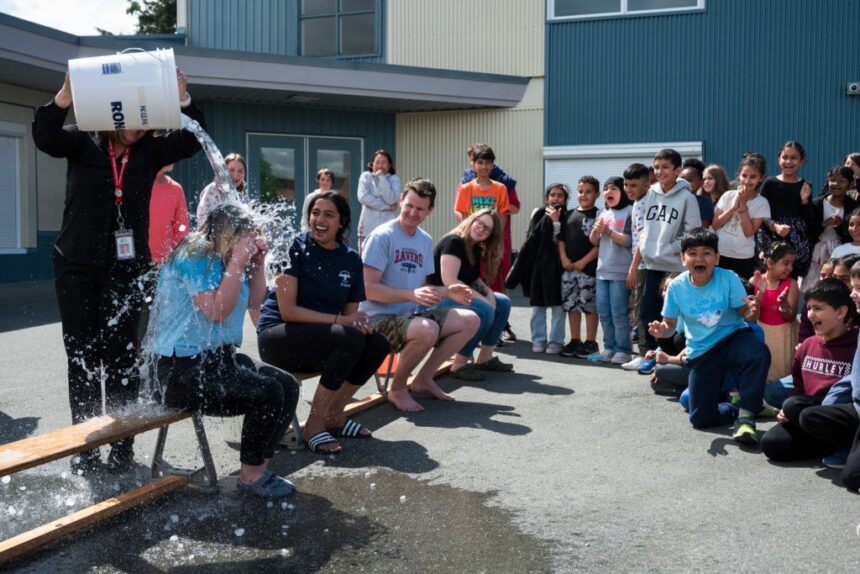The winter chill couldn’t deter Richardson Elementary staff from making a splash for mental health awareness last week. In what has become an annual tradition of courage and community spirit, 15 staff members plunged into the frigid waters of Boundary Bay to raise funds for mental health initiatives.
“The water was absolutely freezing,” laughed Principal Camille Welch, still visibly invigorated from the experience. “But knowing we were doing it for such an important cause made it worth every shivering second.”
The “Polar Plunge” fundraiser, now in its fifth year, has evolved into a cornerstone event for the Delta school, raising over $5,000 this year alone. The funds will support in-school mental wellness programs and contribute to the Canadian Mental Health Association’s local chapter.
I visited Richardson Elementary the day after the plunge, finding the hallways buzzing with excitement. Students proudly displayed posters tracking the fundraising progress, many decorated with blue waves and encouraging messages for their brave teachers.
Teacher-librarian Melissa Kennedy, who helped organize the event, explained the deeper purpose behind the chilly dip. “We’re not just raising money – we’re showing kids that mental health matters. When they see their teachers willing to do something uncomfortable for this cause, it opens up conversations that might otherwise never happen.”
Those conversations are increasingly crucial. According to recent data from Statistics Canada, nearly 20% of Canadian youth report struggling with mental health challenges, with numbers climbing since the pandemic. In British Columbia specifically, the Ministry of Education has identified mental wellness as a priority area in its updated curriculum framework.
The fundraiser began as a small staff initiative but has grown to include community participation. Local businesses contributed matching donations, while parents and community members gathered on the shoreline to cheer on the plunging educators.
Grade 5 student Aiden Park summarized the event’s impact: “My teacher was so brave! And now we’re talking about feelings and brain health in class. It’s cool that grown-ups get scared too, but do hard things anyway.”
For physical education teacher Mark Stevenson, participating carried personal significance. “My own daughter struggled with anxiety last year. These resources make a real difference – sometimes having someone to talk to at school is what gets a kid through a tough day.”
The school’s approach represents a growing trend across Canadian education systems to address mental health proactively. Provincial education ministries have increasingly emphasized social-emotional learning alongside academic subjects, recognizing their interconnection.
Delta School District Superintendent Doug Sheppard attended the event, praising Richardson’s initiative. “What impresses me most is how they’ve made mental health approachable. It’s not just about awareness – they’re modeling resilience and community support in action.”
The funds raised will establish a “calm corner” in each classroom, purchase resources for the school counselor, and train additional staff in mental health first aid. A portion will also support community programs for families facing mental health challenges.
“The ripple effects go beyond our school walls,” noted Vice Principal Teresa Chen, who documented the plunge for the school’s newsletter. “When children see adults prioritizing mental wellness, they carry those values home. It changes family conversations.”
Parent Advisory Council member Jasmine Singh agreed. “My son came home asking questions about mental health after learning about the plunge. It opened a door to discussions we probably wouldn’t have had otherwise.”
As I left Richardson Elementary, a group of Grade 3 students was creating thank-you cards for the participating staff. Their artwork featured smiling faces, hearts, and speech bubbles with phrases like “it’s okay to ask for help” and “feelings matter.”
Perhaps the most telling measure of the event’s success wasn’t the impressive fundraising total, but rather what happened in classrooms the following day. Teachers reported unprecedented openness among students discussing emotions and coping strategies.
“That’s the real victory,” said Welch, pointing to a wall of student reflections. “When a nine-year-old feels comfortable saying they’re struggling and knows where to turn – that’s when we know we’re making progress.”
The Richardson Elementary staff may have dried off from their polar plunge, but their message continues to ripple through the community: mental health matters, asking for help shows strength, and sometimes the bravest thing we can do is talk about how we’re feeling.






